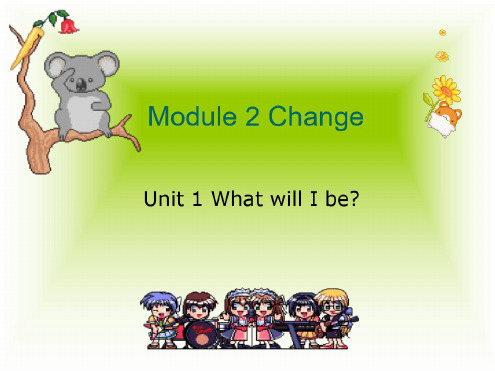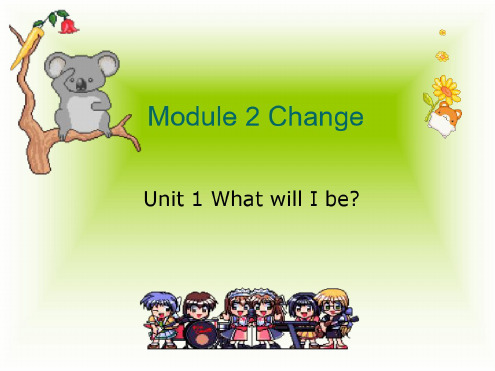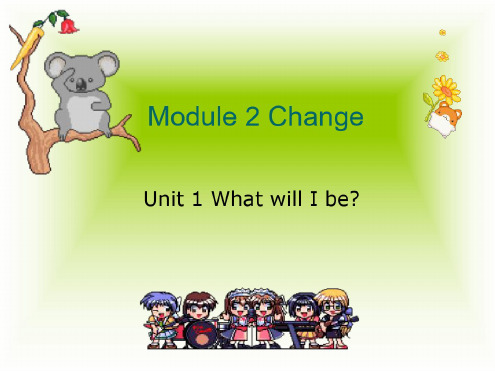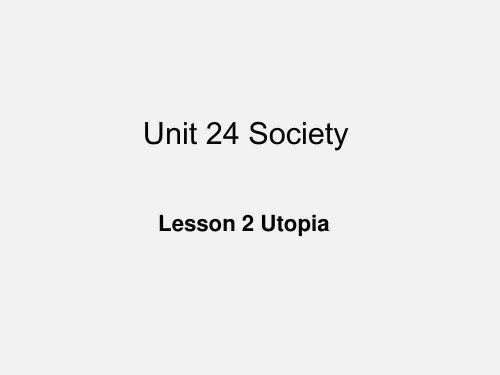上海教育出版社高三第一学期英语《 Society and Change》课件
- 格式:pptx
- 大小:935.08 KB
- 文档页数:19






Unit 3 Times change!主题语境:人与社会——新旧时代社会和生活等方面的对比及改变目录索引1 强基础语基自测2 研考点核心突破3 测效果课堂评价4 练续写锤炼技能1 强基础 语基自测默写查验一、核心单词1. n.十年;十年期2. adj.简陋的3. n.薄雾,雾霭4. n.时代,年代5. n.改进;改革6. n.组成部分7. n.类别8. v.促进;使便利 decade humble mist era reform component category facilitate语境应用Ⅰ.用所给单词的适当形式填空1.In the last (decade),advances in medical technology have made it possible for people to live longer than in the past.2. (category) include art,comedy,music,food anddrink,theater,festivals and talks.3.Many (component) of our food cycle sacrifice environmental impact for convenience.decades Categories components默写查验二、派生单词1. n.同情→ v.同情,怜悯→ adj.同情的,有同情心的→ adv.怜悯地;富有同情心地 2. v.布置;为(房间或建筑物)配备家具→ n.家具→ adj.配备好装备的;带家具的3. v.竞争→ n.竞争;比赛→ adj.竞争的;有竞争性的→ n.竞争者 4. v.强调→ n.强调;重点,重要性 5. vt.占用;占领;占据→ n.工作,职业→ adj.忙于;使用中 sympathy sympathize sympathetic sympathetically furnish furniturefurnished compete competition competitive competitor emphasise emphasis occupy occupation occupied 6. vt.打算→ n.意图,目的 7. vi.& vt.(使)适应;改编→ n.改编;适应 8. n.通道,通路,入口;机会,权利→ adj.易懂的 9. vt.敦促,力劝;竭力主张 n.强烈的欲望,冲动→ adv.紧急地;急迫地→ adj.紧急的,急迫的→ n.紧急的事 10. vt.使确信,使相信→ adj.有说服力的,使人信服的→ adj.确信的,感到信服的→ adv.令人信服地intend intention adapt adaptation accessaccessible urge urgently urgent urgency convince convincing convinced convincingly语境应用Ⅱ.用所给词的适当形式填空1.The young couple didn’t have much money to buy some new __________ any more,because they had spent too much in their house. (furnish)2.The two athletes are for the gold medal.The result of the is hard to predict because the two are bothexcellent and .(compete) 3.His argument me of the truth of the story.Inother words,I was of the story.(convince) furniture furnishing competing competition competitors competitive convincing convinced convinced 4.Although I have for people in difficulty,it is veryhard for me to with the young man begging on the street;in other words, I do not feel towards him at all.(sympathy) 5.It is that we should finish the work in such a short and time.(urge) 6.I am with my ,which mostof my time every day.(occupy)sympathy/sympathies sympathize sympathetic urgedurgent occupied occupation occupies默写查验三、重点短语1. 顺便造访,临时来访2. 挥手告别,向……说再见3.比……有优势4. 永远5. 接管,接任6. 拆毁,拆除7. 突然出现,冒出来8. 一串9. 铺平道路;创造条件10. 一群drop in/by wave goodbye to have an advantage over for good take over tear down pop up a string of pave the way a bunch of语境应用Ⅲ.用左栏所给短语的正确形式填空1.The manager asked me to her job when she was onbusiness.2.The woman wearing pearls around her neck willattend a party this afternoon.3.Please and have a cup of coffee when you are free.4.I believe the agreement will for the furthercooperation of us.5.Unexpected chances or pleasant surprises could at anytime.take over a string of drop in/by pave the way pop up默写查验四、典型句式1.as if引导状语从句中的虚拟语气教材原句:Childhood memories came back to me so clearly,as if the events had happened only yesterday.2.现在分词短语作结果状语教材原句:It has allowed China to accomplish in just four decades what took Western industrialised countries more than 200 years to achieve,breaking new ground in the history of human achievement.3.“疑问词+不定式”作宾语教材原句:Perhaps people will one day choose to communicate in pictures,and forget how to write properly.语境应用Ⅳ.微写作1.她的手停了下来,好像碰到了什么可怕的东西。
Unit 2 Society and changeTeaching aims and demands掌握各种状语从句的基本用法。
Teaching important points and difficulties各种状语从句的概念和用法。
Teaching proceduresStep1.状语从句的基本概念1.状语从句的定义:在复合句中由从句表示的状语称作状语从句,它可以用来修饰谓语(包括非谓语动词)、定语或状语,或是整个句子。
状语从句通常由一个连词引起,也可以由一个起连词作用的词组引起,有时甚至不需要连词直接和主句连接起来。
状语从句一般分为九大类:时间状语从句、地点状语从句、原因状语从句、目的状语从句、结果状语从句、条件状语从句、方式状语从句、比较状语从句、让步状语从句。
2.状语从句的分类:(1) 时间状语从句由下列连词引导:when, while, as, before, after, once, till, until, once, as soon as, now that, hardly…when,scarcely…when,no sooner…than,有一些表示时间的副词(短语)或名词短语也可引导时间状语从句。
如:directly, instantly, immediately, by the time,the moment, the second, the minute, the instant, every time, each time, next time, the last time等注意点如下:1)when, while, as引导的时间状语从句as表示“当……的时候”,往往和when/ while通用,但它着重强调主句与从句的动作或事情同时或几乎同时发生。
所以常译作“一边……一边”。
John sings as he works.①She came up as I was cooking.(同时)②When I was walking down the street, I came across an old friend of mine.when(at or during the time that )既可以表示在某一点的时候,又可表示在某一段时间内,主句与从句的动作或事情可以同时发生也可以先后发生。